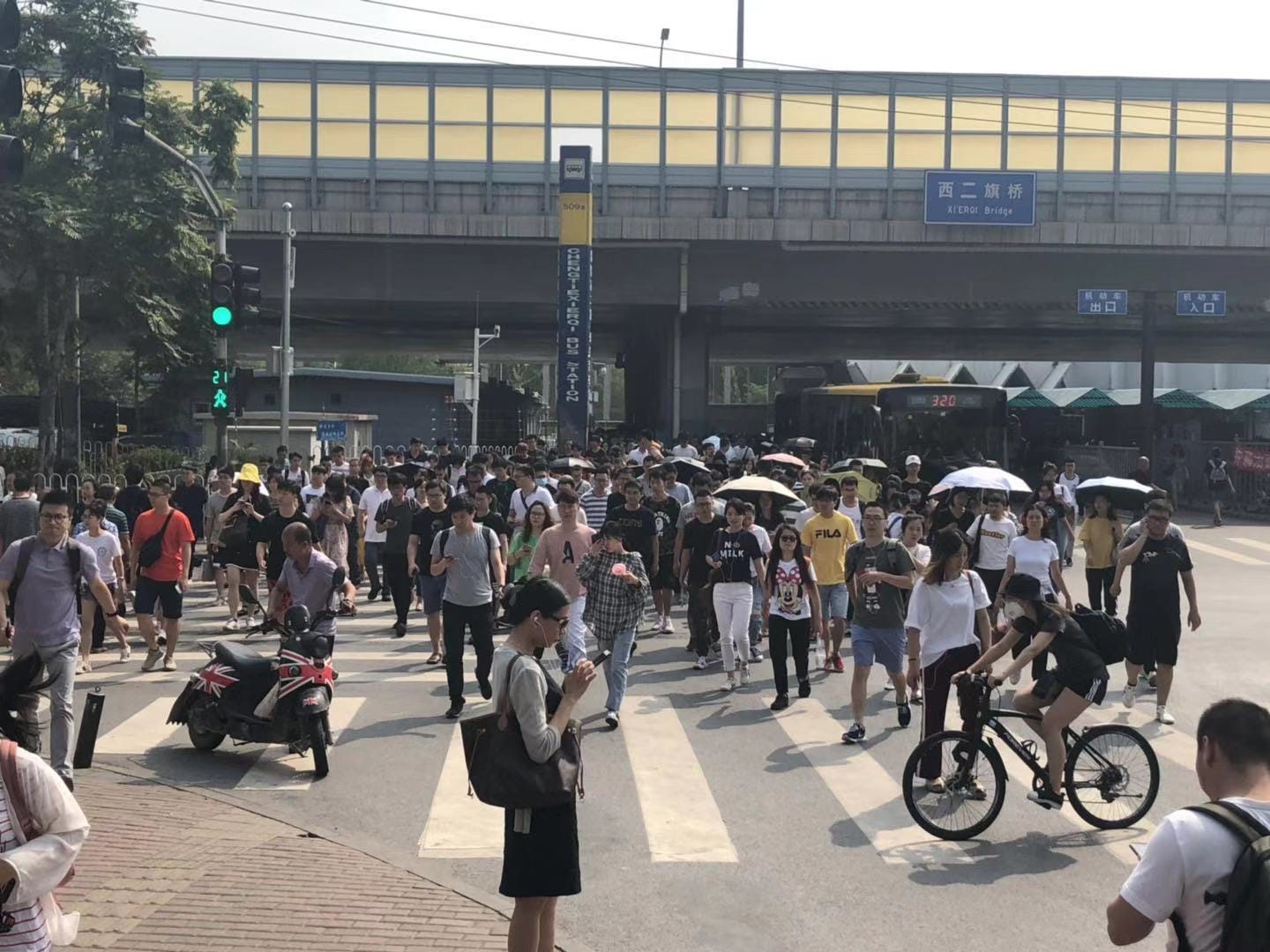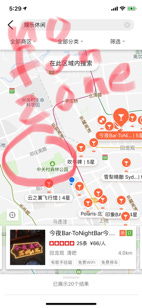Life Sucks in China's Silicon Valley
In this newsletter, I translate articles from Chinese media about tech, business, and political economy.
I also host the weekly ChinaEconTalk podcast. This week’s episode featured part two of an interview with Julia Lovell, author Maoism: A Global History about how Maosim went global.
By the way, I’m hunting for a new name for this newsletter and the podcast (ChinaTalk?). If you suggest the one I pick, I’ll send you a funny taobao shirt. Respond to this email to connect.
Last month I started working in Houchangcun, a subsection of Zhongguancun and Beijing’s true tech capital. It lays claim to tech firms Baidu, Tencent, NetEase, Sina, Didi, Kuaishou, and Lenovo, each working out of their own low-rise office park. Taking the Line 14 train to work, I get on a practically empty car. As the train gets closer to Houchangcun, the train fills up—though not with anyone old enough for me to offer up my seat. Crossing the street outside Xi’erqi Station requires hundreds of 20 and 30somethings to navigate human traffic jams.

Hong Yulin, writing at GQ Reports, presents a particularly negative take on the “996” Chinese internet company lifestyle exemplified by firms in Houchangcun. This piece, based on extensive interviews with anonymized employees, went viral, racking up at least 100k views. The most liked comment under the article said: “The work and lifestyle described in this article makes me think of Marx in ‘Das Kapital’ writing about Britain’s Industrial Revolution.”
Personally I think it’s a bit much. This isn’t the only industry that works overtime in China (see: most things blue collar), and it pays better than comparable opportunities for the highly educated and ambitious. Also while this neighborhood is a bit lacking in amenities, it’s only 20 minutes from the bustling Wudaokou university district and an hour from downtown Sanlitun. That said, this piece plays an important role in giving Chinese their own voice in this debate.
Italics are straight translations, regular text is paraphrase and my own comments.
Lonely in Houchangcun: 30,000 internet company employees can’t leave China’s Silicon Valley
GQ Reports, Hong Yulin, June 10, 2019
Some describe this neighborhood as “China’s highest density of economic output and intelligence, full of ‘code farmers,’ workers with fancy degrees and high salaries, and an average age of 29.”
This is a self-contained world. Identifying someone as a Houchangcun person is simple. Look at their clothes to see if they’re wearing a T-shirt and jeans; look for their work badge, either hanging around their neck or sticking out of their pocket, lanyard exposed.
“However, these are superficial tells, not the most accurate ones,” said Lin Xiaotong. “It’s the expression, the look of the person tortured by life without any vitality left in them. When you see their eyes, you feel, ‘My god, they’re so tired.’”
Hong introduces the pseudonymous “Gao Qi,” a thirtysomething man who spent most of his career working for a multinational and lives in the fashionable Wangjing neighborhood. He recently joined Didi, taking on the brutal commute that comes along with it.
Why join?
For Gao Qi, the answer is simple: high wages and lots of room to develop. In Houchangcun, annual salary bumps of 10% are common; in the 11 years of market-related work he did for overseas brands, the maximum salary increase was 3%.
One day last year, an employee at Kuaishou received an email saying that the company had decided to move from Wudaokou to Houchangcun. Skipping ahead to the end of the story, it read: Everyone should get excited because the nearby food park has KFC, McDonalds, and Professor Tian’s Pork [Chinese fast food]. Once she started working in Houchangcun, she realized that these fast-food joints actually were the best options.
Infrastructure has not caught up to development in Houchuangcun. Many roads have only two lanes, and during commuting hours, traffic piles up. “Shared-bike traffic jams” are common. While Didi reimburses its employees for taxis after 9 p.m., if you try to order a car at 9:02 p.m., you’re likely to be waiting for an hour. One employee told Hong that he got so frustrated with the wait that he ordered food delivery from a nearby restaurant to his house and then asked the delivery guy if he could hop on the back of his electric scooter.”
One night, a Peking University grad working in Houchuangcun was swiping through her WeChat Moments and saw images of her former classmates now in finance out drinking in Sanlitun. “She then went down to the neighborhood 7/11 to buy a coconut water and couldn’t help laughing at herself: ‘There’s a real gap here.’”
Try looking up entertainment options for Houchuangcun on Dianping, and you can see what Hong is talking about: There’s basically nothing in the neighborhood. Your best bet for a night out is a children’s flight simulator center.

If life sucks this much, why not leave? Zhao Kai, who came to Beijing from a small city in Shandong province, said it was probably because his original lifestyle requirements weren’t that high to begin with. After working for a year, he bought himself a Nintendo Switch and was satisfied. When buying clothes, one of his colleagues calculates the price-to-quality ratio: “Anything over three digits [about $30], and I have to have a little think [super cute in chinese: ‘超过三位数我就得think think了’].”
Anecdotally, I find the gender split pretty close to 50/50, with a substantially higher percentage of female engineers than in Silicon Valley. Hong writes that women in Houchangcun are just as fashion-free as men and just as price-conscious. For instance, Lin Xiaotong wore a $8 necklace, a $5 skirt, and a $12 blazer, all bought on Taobao. If you dress any nicer you won’t get any satisfaction from it because “no one cares what you’re wearing.”
Hong worries that engineers are denying themselves the luxury goods their salaries deserve.
In fact, the people of Houchangcun do not lack for spending power. They will put down cash for consumer electronics. One employee spent over $2,000 on an Alienware laptop, a Surface Pro, a fancy mouse, and some AirPods. But many of these products are intended for upgrading productivity, not consumed like the luxury goods enjoyed by folks who work in international trade.
Another employee has had a hard time maintaining friends.
Recalling his college days, he said he found it easy to strike up friendships. Going to the cafeteria, everyone ate watermelon and studied together, and it was easy to find topics of conversation. This isn’t the case in Houchangcun. To make friends here, you have to be super-active. Seen from another perspective, the lifestyle makes it really easy for more autistic, closed-off folks. “If you’re a coder, it doesn’t really matter if you don’t talk to people a lot.” For awkward guys like him, it’s hard to tell whether this is a good or a bad thing.
What follows is what ‘forever alone’ looks like in China.
For the past two years, Lin Xiaotong has been single; the only new friends she’s made were colleagues. A few months ago, she met a programmer who had returned from working abroad. After a month of dating, the guy suddenly said they should break it off because Lin was really bad at communicating—for example, how she would suddenly put everything out in the open without any subtlety. After the breakup, she wondered if she had entirely lost the ability to fall in love and communicate with others.
A friend called her a “suicide single”—never actively expanding her social circle, and just sitting around the house all day fantasizing about love.
To shake things up, Lin started posting on a singles forum on Douban [a social Metacritic]. Someone responded a few days later, but that guy broke things off after realizing she lived too far away.
Next, a colleague recommended that she join a WeChat group for single people. In total, there were 900 group members. Seeing so many other single people, she felt slightly consoled and looked forward to making new friends. But after a few days, she discovered that no one in the group was chatting.
Another employee has faced significant sexual discrimination at work.
She’s 28 years old and has risen to the level of P6 engineer [around $60,000 annual salary on a standard ranking system]. It’s a high rank relative to her peers, but still feels that her professional ability isn’t enough to give her a sense of security. The last time she interviewed, she knew she hadn’t been very impressive but got hired anyways. Later, she asked the manager why they had selected her. He replied, “We need a good-looking woman for this role.” At first she thought the manager was joking, but afterwards she felt gross.
Another time, she was speaking with a female programmer. When she raised an issue, her colleague replied, “You know, good-looking people have to think too.” She didn't say anything—“but inside, I was furious.”
On the topic of “996” [the 72-hour workweek], Zhao Kai feels like the conversation is going in the wrong direction. Everyone’s talking about how they need to be compensated for overtime. But he thinks this line of argument doesn’t make sense. “How much does it cost to occupy our lives and ruin our health? Is this really a matter of money?”
Every Houchangcun office feels like its own little apartment compound where you can stay for 24 hours a day. The cafeteria serves three meals a day; there are gyms where you can take a shower. Sina has a doctor’s office and a hair salon (men’s haircuts $4, women’s $8). NetEase has a hotel with 50 rooms and 100 beds. If you want to stay overnight, you have to book one day in advance.
Zhao Kai feels like he’s back at the state-owned oil company where his parents worked their whole lives. Back then, their work unit satisfied all their basic needs. When he was young, he didn’t understand how people could stay in such a place and accept such a narrow life. But now, living in Houchangcun, he can’t help but reflect: “Am I not cutting off myself from the rest of the world here? How much longer do I have before I too lose the urge to explore?”
------------------------------------------------------
Gao Qi took the leap this this spring when he resigned and joined a multinational. But this time, changing jobs did not bring a salary increase. After experiencing different industries, he understands why people flock to Houchangcun. Recent grads in traditional industries have incomes around RMB 5,000/month (around $9,000 a year). Internet companies pay recent grads twice that much. As long as your work is good, your salary and rank will rapidly rise. “If you’ve experienced the internet, you can’t go back to traditional industry.”
Thanks for reading!
You can contact me on twitter at jordanschnyc, on WeChat at jordanschneider, or just respond to this email.
A version of this article was first published on TechNode.
Scan this in the next few days to join the ChinaEconTalk WeChat group.



